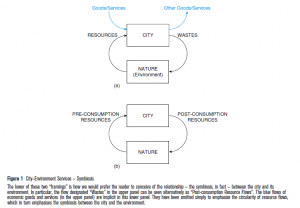Ecosystem Services: Not so Much the Water as What’s in IT
The full (economic, social and ecological) value of ecosystem services is often ignored or underestimated. As with the intangibly valuable, this is much a case of not appreciating the benefits that ecosystem services bring to our well-being until they are lost — when they are degraded, if not overwhelmed. For they are not readily appreciated, nor easily understood. I attempt to illuminate their revaluation in the International Water Association’s Paper on “Understanding the Science of Ecosystem Services: Engineering Infrastructure for Urban Water Services”.
Built Environment & Ecosystem Services
Nature provides for the well-being of Man (as humankind) through ecosystem services: those that provision, in producing food, fibre, and fresh water; others that regulate, as in stabilizing the climate and assimilating water pollutants; those that offer cultural services in serving mind, body, and spirit; and those deeper workings of ecosystems that support and underpin all three categories of the other services. Man, in return, may provide for the well-being of Nature — but does not always do so!
Our built environment, in particular the city’s infrastructure, mediates the relationship between Man and Nature. These three systems, the built, human, and natural environments, interact with each other. There is a symbiosis, in fact, between the city and its surrounding (natural) environment: both generate their own services; even the city is capable of generating ecosystem services to the benefit of the environment.
The two, Humans and Nature, participate in the processing functions and structuring of global material cycles, not only for carbon, with which we are now so familiar (under the prospect of climate change), but also for nitrogen, phosphorus, and many other resource flows.
What goes around, comes around. These material cycles — though beneath the surface of our everyday experience of urban infrastructure and buried away from our immediate gaze in all the stuff that passes through our households and ourselves — are what bind people and Nature together. Pre-consumption resources flow into the household and post-consumption resources flow out. At some point, the post-consumption resource flows are to be renewed — through ecosystem services — and returned to our households as pre-consumption resources (once again).
Hence we have the concept of humans as prosumers (with the interrelated processes of production and consumption). And not just in respect of households both producing and consuming electricity, where the term has been popularised, but also in the materials flowing through the household and entrained in what we have previously discarded as waste and wastewater. This is the significance of the prosumer in the water sector— and how aptly contrived a word it is, wherein the thought of producing precedes that of consuming. It is all very much cross- and multi-sectoral: the water, food, energy and climate sectors of the Nexus [1]. It is very much in the outward-looking, inter-disciplinary spirit of IWA’s new magazine, The Source.
So think now of the metabolism of the city as being driven by the supply of water coursing through it, and this stream of water itself turning materials-resource recycling wheels spinning both upstream and downstream of the notional household. Upstream, the one wheel recovers the materials added to the water to purify it for potability (witness the business of Reststoffenunie, who trade in the by-products won back from drinking water treatment). Downstream, the other recovers the impurities introduced into the water as a result of city-household metabolism — witness the Billund Biorefinery in Denmark, as today’s vision of history’s sewage farm. We might even conceive of the Biorefinery as a “metro-chemicals” complex, intended to refine energy and nutrient products from its crude stock of municipal wastewater.
It is indeed “not so much the water, as what’s in it”. What is more, oddly enough, understanding the science of ecosystem services may be the key to technological innovation.
Science of Ecosystem Services for the Technology of Urban Water Services
The science of the biogeochemistry of global material cycles is pivotal: both in acquiring an understanding of ecosystem services; and in applying the knowledge so gained in developing and deploying clean technologies for the water infrastructure of cities.
Above all, applying inter-disciplinary Systems Thinking prompts the insight of this extrapolation. Take our accumulating understanding of the science of the downstream, green-blue natural environment; then engineer the biogeochemistry of this understanding back up, along the arc of post-consumption urban resource flows, into re-forming the grey, upstream core of the city’s built environment; and all in order to manage ecosystem services. Such thinking disrupts our customary understanding of what is city (the doings of people) with what is environment (the doings of Nature).
It is already happening, through the recent re-engineering of the Soerendonk wastewater treatment plant in the Netherlands — the outcome of a partnership of the ecologically inspired thinking of Stockholm-based The Natural Step and the engineering practice of DHV Engineers. It is one of six key case studies in my Paper.
This, then, is developing technology on the basis of an understanding of ecosystem services to push the practice of resource renewal even further into the intimate spaces of the lives of each and everyone of us. This means making choices about what we consume in our households according to the resources we shall pass on to others. Only then can we begin to contemplate future climate change and the long-term aspiration of sustainability in the conduct of humanity’s affairs vis-à-vis Nature [2]
[1] Learn more from the Nexus Dialogue Synthesis Papers: Natural Infrastructure in the Nexus and Nexus Governance: Harnessing Contending Forces at Work.
[2] Check out the Specialist Group on Sustainability in the Water Sector to learn how you can get involved in their activities and publications.


